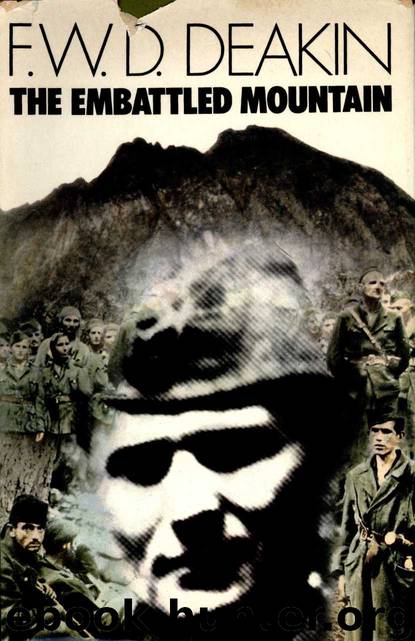Frederick William Deakin by The embattled mountain

Author:The embattled mountain [mountain, The embattled]
Language: eng
Format: epub
ISBN: 0192151754
Publisher: Oxford University Press
Published: 1971-05-14T22:00:00+00:00
This telegram was dated 29 November.
In spite of obstruction from Mihailović, it seems that Hudson maintained contact from time to time with Tito in Užice. It is probable that he was on such a trip, or on a local tour of inspection, when the laudatory telegram from London arrived at Ravna Gora, for on 1 December Mihailović cabled on his own set: ‘The morale of my troops remains excellent. Captain Hudson has not returned. He is cut off from us. Telegraph us in Serb. Mihailović.’
On the morning of 29 November German troops had entered the Partisan ‘Republic of Užice’, and the main surviving body of Partisan units withdrew westwards into the Sandžak. In the confusion Hudson found himself caught up with Tito and his staff, and it is improbable that the London telegram was ever delivered as intended.
On the previous day, 28 November, Tito had telephoned to Mihailović asking him what he proposed to do, and received the reply that the Četnik odreds would ‘return to their territories, and carry out suitable guerrilla action until conditions for a general rising existed’.(7) This brief interchange marked the end of any further contact between the two men.
On 30 November Mihailović held a meeting of his commanders on Ravna Gora and it was decided to ‘legalize’ the Četnik units in agreement with Nedić and in common action against the Partisans.
On the same day Mihailović signalled to General Simović that ‘the Communists have evacuated Užice and their whole force is withdrawing to Zlatibor [a mountain range on the borders of Western Serbia on the route to the river Drina]…. They are few in numbers and badly led.’ He, Mihailović, would continue ‘Četnik warfare’: the morale of his troops was excellent. He endeavoured to convince London that the Partisans, and in particular their leadership, no longer existed as an organized force in Serbia and that he was persistently working for ‘the unification of popular forces and the creation of a Balkan front’.
On 2 December Mihailović signalled that he was ‘at war with the Germans and had entered into complete guerrilla warfare’. On the following day he issued orders to attack the Partisans. The breach was complete and the assumption clear: by parallel action with the German operations the menace of Communism in Serbia, which had threatened since September to master control of the rising, was at an end.
On 5 December Mihailović radioed that he could not maintain radio communications. The last contact with Malta was a message received that evening. He was retreating, and was unable to receive any supplies until he could make fresh contact. ‘I am continuing guerrilla warfare as it suits the reality of the situation’.(8)
Hudson accompanied Tito and his remaining forces ‘in a two-day rout’ across Zlatibor mountain. After crossing the Uvac river on the borders of the Sandžak, Hudson decided to return on his own to Serbia. ‘I got the impression everywhere that British help was best concentrated on Mihailović if he still exists independently of Nedić. I told Tito and Co.
Download
This site does not store any files on its server. We only index and link to content provided by other sites. Please contact the content providers to delete copyright contents if any and email us, we'll remove relevant links or contents immediately.
What's Done in Darkness by Kayla Perrin(25499)
Shot Through the Heart: DI Grace Fisher 2 by Isabelle Grey(18218)
Shot Through the Heart by Mercy Celeste(18160)
The Fifty Shades Trilogy & Grey by E L James(17774)
The 3rd Cycle of the Betrayed Series Collection: Extremely Controversial Historical Thrillers (Betrayed Series Boxed set) by McCray Carolyn(13189)
The Subtle Art of Not Giving a F*ck by Mark Manson(12908)
Scorched Earth by Nick Kyme(11831)
Stepbrother Stories 2 - 21 Taboo Story Collection (Brother Sister Stepbrother Stepsister Taboo Pseudo Incest Family Virgin Creampie Pregnant Forced Pregnancy Breeding) by Roxi Harding(11038)
Drei Generationen auf dem Jakobsweg by Stein Pia(10216)
Suna by Ziefle Pia(10185)
Scythe by Neal Shusterman(9259)
International Relations from the Global South; Worlds of Difference; First Edition by Arlene B. Tickner & Karen Smith(8608)
Successful Proposal Strategies for Small Businesses: Using Knowledge Management ot Win Govenment, Private Sector, and International Contracts 3rd Edition by Robert Frey(8419)
This is Going to Hurt by Adam Kay(7693)
Dirty Filthy Fix: A Fixed Trilogy Novella by Laurelin Paige(6450)
He Loves Me...KNOT by RC Boldt(5804)
How to Make Love to a Negro Without Getting Tired by Dany LaFerrière(5378)
Interdimensional Brothel by F4U(5303)
Thankful For Her by Alexa Riley(5160)
